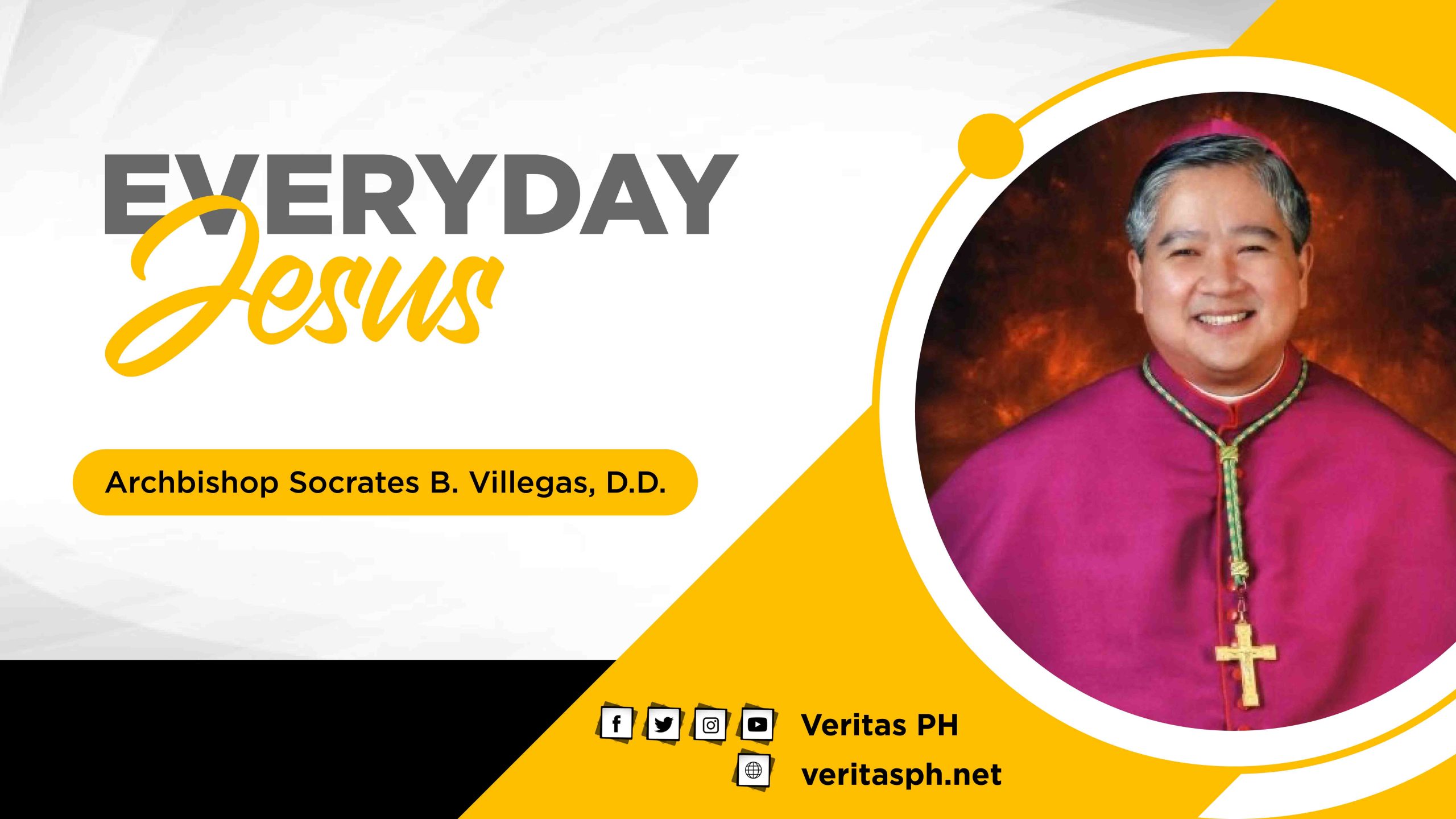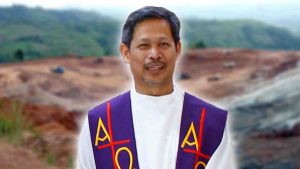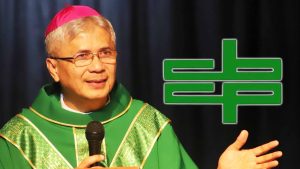389 total views
Very Reverend Father Gilbert Sales, CICM, brothers and sisters in Christ:
Thank you Father Gilbert Sales, CICM and the faculty of Saint Louis University in Baguio City for this unexpected and undeserved honor. I can now say with pride that I am an alumnus of this university. I am still asking why SLU decided to include me in your list of honorary degree recipients. I suppose you know that together with some bishops and priests, I have been accused of sedition and inciting to sedition? I suppose you are aware that I have been called nasty and cuss names and the God I serve was branded stupid? I suppose you know that I have been threatened not only with imprisonment but also death? From one point of view, I am a high-risk man. SLU, why me?
I stand not on my personal convictions but on the teachings of our Church and the Gospel of my Master. If you tell me that you want to honor my Master and my mother Church, I accept this honor with a deep sense of gratitude. Not to me but to God and the Church be the honor!
Dualistic Spirituality
Philippine Christianity has been dubbed by many as “nominal Catholicism” or “split-level”. People say we have been baptized but not really evangelized. At the risk of generalization, many of our social values do not really exhibit the Christian faith. PCP II writes: “If we go by the media reporting today on crimes of violence, graft and corruption, abuse of power, the many grave social ills that plague the nation, we have to wonder about our claims to Christianity” (PCP II, 15). Written more than 30 years ago, it is still an apt description of our present society. There seems to be a noticeable divide between our faith and our politics, between our religious practices and our economic undertakings, between our believing and our everyday living.
This dualistic divide came to a hilt during the last election. When our pastors talked against corruption and historical revisionism, and pointed out the social culprits, many pious lay people, and clergy themselves, charged them with “politicking”. “Ang mga pari ay dapat mangangaral lamang tungkol sa kabutihan, pagpapatawad at pananampalataya. Hindi na dapat sumawsaw pa sa pulitika.”
Observers notice four kinds of Christians around us.
First, there are “apolitical Christians” — those who think that our home is in “heaven” and what happens in this “world” is of little value at all. Political participation does not help achieve salvation; it is at best a distraction.
Second, there are “neutral Christians” — those who follow the minimum requirements of political duties like the elections, but consider it a “private affair”. There is no connection between their faith and their socio-political option.
Third, there are Christians who are “non-neutral but also non-partisan”. They call out society on human rights violations but refuse to name names or promote partisan candidates. This is the ideal for the clergy and religious, or the canon law exhorts them to be.
Fourth, there are Christians who are “non-neutral and partisan”. They are those who, because of their Christian conviction, engage in social and political issues and get involved in partisan politics. Among your friends, you can count them with your fingers.
The last two are possible Christian responses. But the first two has never been a viable Christian option at all. Let me elaborate on this in recent theological developments.
Politics, Charity and Truth: Benedict XVI
Pope Francis recently became viral with this quotation: “A good Catholic meddles in politics, offering the best of himself so that those who govern can govern.” The main idea is actually based on his recent encyclical, Fratelli Tutti: “Politics is a lofty vocation and one of the highest forms of charity, inasmuch as it seeks the common good” (FT 180).
But Pope Francis was only quoting Pope Benedict XVI. Benedict has been always criticized as a conservative pope; one who has always advised us to shun politics. Both his critics and traditionalist admirers misuse him to advance their own agenda. We are still mourning for his loss. But we need to recover one of the late pope’s greatest contributions to the theology of Christian social engagement.
Writing a little more than 40 years after Populorum Progressio which talked about the development of peoples, Benedict’s contribution is to root authentic social development in love, truth and justice. He did this in Deus caritas est (2005) and Caritas In Veritate (2009) — his last two social encyclicals. We can synthesize this in three simple points.
First, everything proceeds from love. “God is love (Deus caritas est): everything has its origin in God’s love, everything is shaped by it, everything is directed towards it” (CV, 2).
Second, charity can only shine in truth — the truth of God and the truth and dignity of human beings. “Only in truth does charity shine forth; only in truth can charity be authentically lived” (CV, 3). When lies and deception abound, charity also dims in our lives.
Third, this charity in truth can only be lived in just relationships within society (Caritas in veritate in re sociale). “On the one hand, charity demands justice: recognition and respect for the legitimate rights of individuals and peoples… On the other hand, charity transcends justice and completes it in the logic of giving and forgiving” (CV 6).
Each Christian, therefore, is asked to practice this kind of charity that seeks the common good within political societies. “This is the institutional path — we might also call it the political path — of charity, no less excellent and effective than the kind of charity which encounters the neighbor directly” (CV 7). If there is anything that the late pope wanted to say, it is this: that true development of peoples (the consistent theme since Populorum Progressio) can only be pursued in charity illumined by truth and justice in social, juridical, cultural, political and economic fields.
Political Love: Pope Francis
Pope Francis picks up from where Benedict XVI has left off. He developed these deep metaphysical reflections into its concrete social and political ramifications. He names it “political love”. In Fratelli Tutti, Pope Francis writes, “Love, overflowing with small gestures of mutual care, is also civic and political, and it makes itself felt in every action that seeks to build a better world. For this reason, charity finds expression not only in close and intimate relationships but also in macro-relationships: social, economic and political” (FT, 181).
When a person in need — the one stranded on the road — shows up at some crossroads in our lives, what shall a Christian do? Reflecting on the parable of the Good Samaritan, he says: “Now there are only two kinds of people: those who care for someone who is hurting and those who pass by; those who bend down to help and those who look the other way and hurry off” (FT, 70).
Two corollaries: (1) our choice to pass by or stop by someone in need defines our humanity; (2) charity is not just a personal virtue; it is an institutional act.
First, Pope Francis forced the Christian conscience to make a crucial decision in its encounter with social vulnerability. Political charity is not optional. It is a necessary choice, if one wants to be Christian; or better still, if one wants to be human. In front of the vulnerable and the needy, neutrality is not a Christian option. When people are killed left and right or when they are dying because the leaders of our society stole the money which is due them, to be neutral is immoral. In the face of the victim, those who are neutral are allies of the victimizers (FT 75).
We are then forced to ask what is our basic life direction? The great Protestant activist and preacher, Martin Luther King, Jr. commented on the Good Samaritan: “The first question which the priest and Levite asked was: ‘If I stop to help this man, what will happen to me? But the Good Samaritan reversed the question: ‘If I do not stop to help this man, what will happen to him?” We either go on with life preferring our personal safety or offering ourselves for the service of others. However one decides spells what ethics call our “fundamental option”. Do we bend down to help or do we look the other way and hurry off? Your answer spells who fundamentally you are.
Second corollary: love is social. The Good Samaritan was able to help because there was an inn. He could not carry the dying all the way by himself. Charity is not only a personal virtue; it is structural and institutional. Charity should “not only be affective; it should also be effective,” St. Vincent de Paul used to preach.
Martin Luther King continues: “I am tired of assisting stranded people on the road,” he says, “I will make this road safer so that there will be no more robbers on this way.” Beyond the feeling of pity for someone and helping him with a series of benevolent acts, compassion means making social, political and economic structures of society work for the victims and the vulnerable. It means setting up a network that defends human rights; preaching to denounce social evil; campaigning for and electing honest politicians, or working for justice and peace. These are hardly neutral activities at all. One can get killed doing these things like the prophets of old.
Today as you honor the unworthy me with this Doctorate in Philosophy in Philosophy, I renew my pledge. I will live for love and be ready to die for love. I will make peace through dialogue. I do not believe in peace without justice. I will make peace through love. I do not believe in peace without repentance. I will make peace through prayer; I do not believe in peace without God. I believe in peace because I believe in God. Help me to make peace and be ready to pay its price. Let my life be for peace; when I die or if they kill me…
May the world receive new peace in my sacrifice!
***
POLITICAL LOVE
(Speech delivered by Archbishop Socrates B. Villegas on January 26, 2023 at Saint Louis University in Baguio City on the occasion of the conferment of the honorary degree Doctor of Philosophy)








